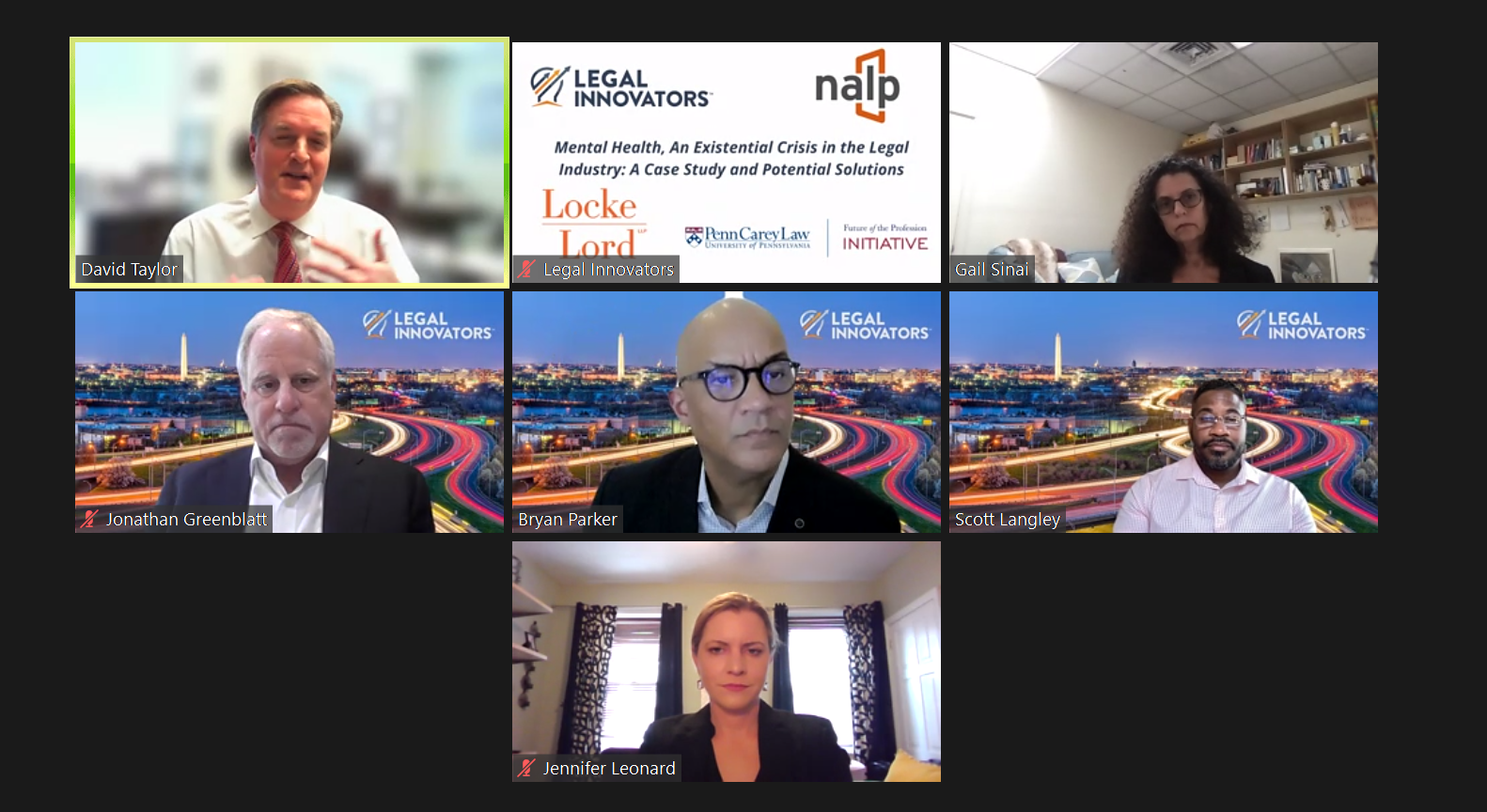By: Kayla Cruz and Oriana Alexander
Mental health and well-being go hand in hand with career satisfaction. Positive mental health helps employees cope with increasing and changing responsibilities at work while tending to personal wellness goals. However, the legal profession, a profession characterized by tradition and status quo, has found itself amid a growing mental health crisis. Research shows that lawyers are prone to stress-related illnesses including depression, anxiety, insomnia, and addiction. In the Covid-19 era, many attorneys are further isolated, have less work and personal boundaries while working from home, and live with the stigma that seeking help for a mental health breakdown will negatively impact their professional careers.
What Are the Challenges Attorneys Face in Getting Help?
During this Legal Innovators’ mental health webinar, moderated by CEO Bryan Parker, panelists Gail Sinai, Jennifer Leonard, David Taylor, Scott Langley, and Jonathan Greenblatt weighed in on the mental health crisis in the legal industry and the barriers to getting help. The word of the afternoon was ‘intentionality,’ and the panelists agreed that the lack of real effort in addressing the law firm paradigm’s pressing mental health issues keeps the legal industry stuck in a loop. For example, Jonathan Greenblatt highlighted that many partners believe that because they had to “suffer” to get to where they are, young attorneys should thus suffer as well. He explained that this mentality is archaic and harmful to growth in the field. Furthermore, he recognized that because firms are largely profit-driven, there is resistance to industry change because profits are presently up. Moreover, Jennifer Leonard noted that the law is a very serious profession that rarely invites creativity and innovation.

The mental health crisis is exacerbated by race and gender disparities within the legal field. Panelist Scott Langley suggested that young black attorneys were not likely to express when they face mental health issues because of the added pressure to prove their worth in the industry. Similarly, women feel pressured to prove that their roles as caregivers to children and elders will not get in the way of job responsibilities. Still, when people experience stress and are overwhelmed, it undoubtedly reflects in their work and productivity. As panelist Gail Sinai noted, when these issues are left untreated, people revert to their “formulas of operation” to cope, which can be harmful, even if they are coming from a place of good intention. Those formulas can be harmful to the individual, the workspace, and company.
What Are Some Working Solutions to Address These Mental Health Challenges?
The panelists offered various solutions to address mental wellness in law firms. Normalizing therapy and prioritizing balance were top priorities in the solutions discussion. The panel acknowledged the correlation between mental wellness and diversity, equity, and inclusion. The solutions the panelists provided for improving mental wellness ranged from large changes at the systemic level to small changes at the individual level.
At the systemic level, productivity and efficiency are incentivized at law firms while wellness and balance are often overlooked. Jennifer Leonard suggested that law firms should prepare for younger generations who place high value on doing impactful work and contributing to projects as a whole. David Taylor highlighted the need for outside pressure from clients to respect the boundaries and mental wellness of attorneys at firms.
At the individual level, Gail Sinai suggested that attorneys acknowledge the dangers of toxic positivity and encouraged individuals to work through their untreated trauma. Scott Langley noted that mental wellness should be addressed earlier in the legal career and that law schools should provide students with mental health strategies. David Taylor emphasized the importance of service and outreach for attorneys.
Key Takeaways
The need for mental health awareness in law firms is real and growing. Not only is addressing mental health important for individual wellness, but statistics show that U.S. businesses lose over $200 billion in revenue annually due to mental health and substance abuse issues.[1] Depressed employees have 3.7 times more unproductive time at work per week than their non-depressed colleagues because of difficulty concentrating and decreased interest in work.[2] In response, many firms offer mental health benefits. Free programs like the American Bar Association’s Lawyer Assistance Program and the Lawyer Depression Pipeline are available to help attorneys in need.
Want to learn more? Watch the full webinar here.
[1] Jarrod F. Reich, Capitalizing on Healthy Lawyers: The Business Case for Law Firms to Promote and Prioritize Lawyer Well-Being, 65 Vill. L. Rev. 361 (2020). Available at: https://digitalcommons.law.villanova.edu/vlr/vol65/iss2/3
[2] Ibid.




